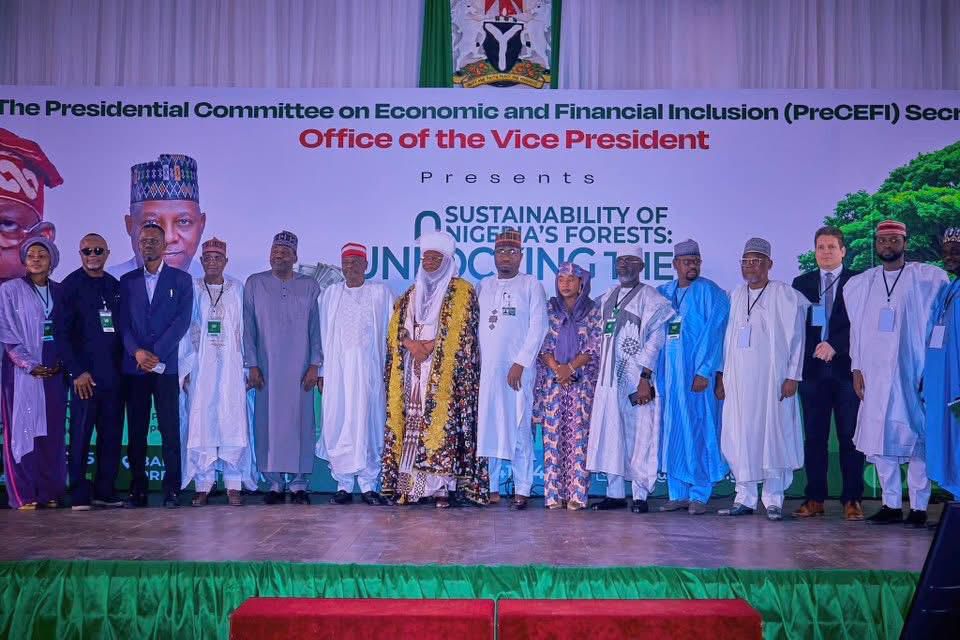Governor Radda Seeks N50bn Investment in Katsina’s Carbon Portfolio, Proposes KAGGA as National Model

Katsina – 22 July, 2025
Katsina State Governor, Malam Dikko Umaru Radda, has urged investors and development partners to support the state’s ambitious N50 billion Carbon Portfolio initiative, calling for the adoption of the Katsina Green Growth Agenda (KAGGA) as a national framework for transforming Nigeria’s forest economy.
The appeal was delivered at the Nigeria Forest Economy Summit 2025 held at the Presidential Villa, Abuja, through the Governor’s representative, Prof. M. A. Al-Amin, who serves as Senior Special Adviser on Climate Change.
According to the Governor, Katsina State has witnessed a 15% loss in forest cover and faces severe drought across 60% of its farmlands. However, he emphasized that these challenges have led to the development of innovative solutions captured under KAGGA, which was officially launched in April 2025.
“Our forests, once threatened by desertification, deforestation, and insecurity, are now central to a renewed vision of ecological and economic resilience,” the Governor stated.
KAGGA, described as a blueprint for balancing ecological restoration with economic development, is anchored on four strategic pillars aimed at achieving key targets by 2030. These include protecting half of the state’s farmland through Climate-Smart Agriculture, electrifying 500 rural communities using solar mini-grids, and advancing community-driven ecosystem restoration.
The plan also features a Green Industrialization initiative designed to transform forest products into high-value goods. This will be supported by a N50 billion Green Investment Fund and reinforced through updated climate legislation.
Governor Radda projected that the green economy initiative could generate up to 100,000 jobs in sustainable forestry and eco-tourism by 2035. He also highlighted the potential for unlocking annual revenues of N3.5 billion from waste recycling and N4.2 billion from plastic upcycling, alongside the development of a $500 million Solar Industrial Park in partnership with Genesis Energy.
The state’s forest reserves, covering over 1,200 square kilometres, currently sequester nearly 200,000 tonnes of carbon. Ongoing efforts include a one-million tree-planting campaign aimed at reducing 1.5 million tonnes of CO₂ by 2035.
Radda invited stakeholders to partner with the state in creating Africa’s first sub-national carbon trade hub, leveraging Katsina’s experience in afforestation across arid landscapes.
To secure the initiative’s success, Katsina is collaborating with agencies like the Border Community Development Agency (BCDA) and the Presidential Committee on Economic and Financial Inclusion (PreCEFI). These partnerships aim to protect forest corridors in frontier communities, combat illegal logging through community-led policing and digital surveillance, and reduce investment risk via tax incentives and blended finance.
The Governor also highlighted the inclusive nature of KAGGA, with 30% of its funding allocated to women and youth-led green enterprises. “Our villages are not relics of the past. They are laboratories for the future,” he noted, underscoring the role of innovation in rural development.
In closing, Radda made three key appeals to summit participants: invest in Katsina’s N50bn afforestation fund; replicate the KAGGA framework at the national level; and support PreCEFI’s “Green Borders” project to safeguard frontier forests.
The Governor also revealed plans to establish a Carbon Innovation Hub that will integrate advanced technologies such as IoT-based reforestation systems and blockchain-tracked carbon credits.
The Forest Economy Summit convened a wide array of stakeholders—including federal and state officials, development partners, and private investors—committed to advancing sustainable forest management and climate resilience across Nigeria.

